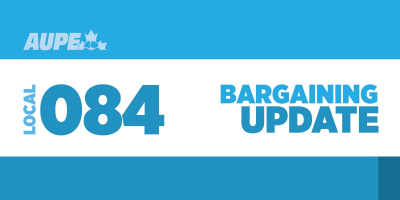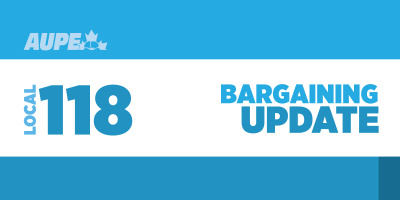Bargaining Update for Local 118, Chapters 018 & 019, ALL STAFF
Your negotiating team needs to hear your priorities
Although we made some progress in mediation, we couldn't reach a settlement. So, we need to update the membership on what transpired, what the sticking points are, and we need to get direction from members on what our next steps will be.
This consultation started with a membership meeting on May 12 and will be followed by one-on-one discussions. We will report on the results of our consultation at another meeting on Tuesday, May 31, after which we will let the employer know what the membership has decided.
Some progress in mediation
We worked with mediator Mia Norrie who helped us work out a “framework for settlement.” Mediators don’t have the power to impose a settlement but can only help focus the parties on what is truly essential to each and try to find a way forward to a negotiated settlement and remind them of the risks for each side if we don’t reach a settlement.
In the framework, Legal Aid agreed to drop their proposal for extended hours as well as all other “rollbacks” (e.g., to maternity leave, vacation etc.) that they had initially proposed. Similarly, we agreed to remove our proposals for new language such as for limits on monitoring/evaluation or parameters for training, except as they relate to other areas of the framework.
Also contained in the framework are guidelines for non-bargaining unit members doing client intake, parameters for ongoing work from home (WFH), and transitioning away from Earned Days Off (EDOs). If we were successful in agreeing on those items, we would move on to negotiating monetary compensation. If not, the original proposals of both sides would be “back on the table.”
We were able to agree on:
- A Letter of Understanding (LOU) outlining WFH parameters – members could request an ongoing WFH arrangement if they were meeting Quality Assurance standards. The letter also outlines things like providing notice if you had to attend the office for training, or if the employer was ending the arrangement because of performance problems.
- An LOU on “Access to Justice” – Legal Aid can work with non-bargaining unit individuals/organizations to do client intake provided it doesn’t result in job loss. The letter also clarifies how the follow-up duties from external client intake are assigned to bargaining unit members.
We were not able to agree on how to transition away from EDOs.
- Our position is that we could only agree to remove EDOs if they were replaced with something or some combination of things of equivalent value.
- Legal Aid felt that the WFH was of equivalent value, along with two “bonus days” which would be paid days off that would not have to be earned.
- We could not agree because WFH would not be a guaranteed entitlement like EDOs are currently. Also, two paid days doesn’t come close to the financial value of EDOs. If the additional time worked under the EDO scheme were paid instead of banked, it would amount to more than 7% increase in income.
- Our proposal for a replacement to EDOs of approximately equivalent value was:
- Increase in paid hours of work by 15 minutes/day. This would result in approximately 3.6% increase in income. The additional 15 minutes would be achieved by maintaining the current length of scheduled hours under the EDO scheme, but with a half hour of unpaid lunch, instead of 45 minutes. For those who prefer 45-minute lunches, they would have the option to use one of their 15-minute breaks to add to the lunch break. If EDOs were removed as Legal Aid proposes, you would work a half hour shorter day and take a one-hour unpaid lunch.
- Addition of the two “bonus days” Legal Aid proposed, subject to operational requirements.
- Addition of two more personal days (6 vs. 4) which could be used for family illness.
- Payment of $1,000 lump sum for WFH expenses prorated by hire date during April 1, 2020, and April 30, 2022 (if you were subject to the mandatory public health order requiring people to WFH).
Salary increases
Our wages have been frozen for over six years, with no cost-of-living increases. Further, in our last round of bargaining, Legal Aid changed job classifications and subsequently reduced the wages for CCIOs and CTOs, so that new employees are paid substantially less than senior employees for the same work. The bargaining committee has always been opposed to this two-tier pay system, and we continue to actively pursue equitable pay.
Comparable recent contract settlements, including the Government of Alberta, have agreed on 3.25% pay increases for 2023.
Legal Aid offered only 1.5% lump sum for one year (previous 12 months from the date of ratification) plus a 1.25% pay increase for 2023. Alternately, they were willing to put 1.5% on the grid in 2024 instead of as a lump sum upon ratification.
Although this offer was very low, we said we could live with it if they accepted our proposal on EDOs, since the increase of 15 minutes paid per day would result in a 3.6% increase in income. We felt this was an extremely reasonable offer that would allow them to achieve their goal of eliminating EDOs and still put more money in the pockets of our members at a time of runaway inflation.
They refused.
What happens next
We are consulting with members because of this impasse in mediation. We want to confirm that members want to push for all three of the priorities our last proposal would achieve: WFH, pay increases, and a fair trade off for EDOs. If that is not the will of the membership, we could go back to mediation with a different mandate, for example to give up EDOs in exchange for WFH but push for 3.25% wage increases.
The initial membership meeting on May 12 confirmed through poll questions that members want us to maintain our last position, and not reduce it to come closer to what Legal Aid is offering. However, we will take the next week or so to consult with all members, including those who were not at that first meeting.
It is important for members to understand that it is only our collective action that will convince Legal Aid to change their current position. If we go back to mediation and tell Legal Aid that our members support our position and they still don’t budge, our next step would be ending mediation by telling the mediator to “write out.” This would begin a 14-day “cooling off” period after which we could hold a strike vote. We would only initiate a legal strike vote once we were confident that we would achieve a solid majority.
In some cases, a solid strike vote is enough to convince an employer to change their position. In fact, this happened in a previous round of bargaining with Legal Aid when they also wanted to eliminate our EDOs. Our strike vote was 95% in favour, but we didn’t have to actually go on strike because Legal Aid agreed to drop their demand to eliminate EDOs.
Would Legal Aid actually risk a strike? It would be incredibly damaging to their reputation and operations. Similarly for workers, a strike is always a last resort. If we decided to take that step, it would only be with the full endorsement of our membership to “draw a line” with our employer and show them that they cannot keep taking things away from us and pushing us to do more with less.
After a successful strike vote, we can serve strike notice as early as 72 hours later or as long as 90 days later. This means we would have time to confirm that members were truly ready to take that “last resort” step.
May 31 membership meeting
This is when we will confirm the results of our consultation and the direction from you the members to us as a bargaining committee to return to mediation. We will continue to update you on what happens from there on and make sure that everyone has a say before we move on to any of the potential future steps described above.
All members should make every effort to attend this important online meeting. You can also help in advance of that meeting by fully informing yourself and asking for any additional information you may need to make up your mind and helping other coworkers do the same. We are stronger together!
TIME: 6 p.m., Tuesday, May 31.
TOPIC: Legal Aid Bargaining Update.
ZOOM information: Click on this link to attend.
https://us06web.zoom.us/j/86737668340
Or join by phone:
Meeting ID: 867 3766 8340
Phone: +1 587 328 1099
Please do not hesitate to contact a member of your negotiating team or AUPE resource staff with any questions, comments or feedback you may have.
AUPE NEGOTIATING TEAM – LEGAL AID SOCIETY
Jan Davidson-Carey
403-404-2307
jan.davidson@hotmail.com
Michele Lucas
780-288-2535
michele.lucas394@hotmail.com
Peter Dubourt
780-293-5141
pdubourt@yahoo.ca
Raman Deep (Alternate)
780-905-9662
ramandeep_83@hotmail.com
AUPE RESOURCE STAFF
Merryn Edwards Negotiations
m.edwards@aupe.org
Farid Iskandar Organizing
f.iskandar@aupe.org
Terry Inigo-Jones Communications
t.inigo-jones@aupe.org


